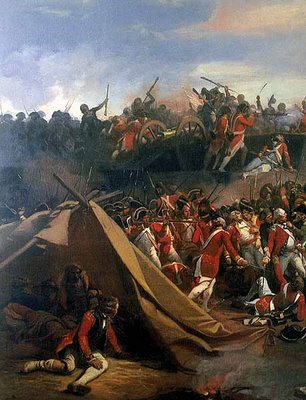
The American forces, made up from forces from New York and throughout New England, under the command of Lt. Col. Alexander Hamilton, were the attackers at Redoubt #10. As usual, Jospeh Plumb Martin, of Connecticut, was there. -
"At dark the detachment was formed and advanced beyond the trenches and lay down on the ground to await the signal for advancing to the attack, which was to be three shells from a certain battery near where we were lying. All the batteries in our line were silent, and we lay anxiously waiting for the signal. The two brilliant planets, Jupiter and Venus, were in close contact in the western hemisphere, the same direction that the signal was to be made in. When I happened to cast my eyes to that quarter, which was often, and I caught a glance of them, I was ready to spring on my feet, thinking they were the signal for starting. Our watchword was 'Rochambeau,' the commander of the French forces' name, a good watchword, for being pronounced Ro-sham-bow, it sounded, when pronounced quick, like rush-on-boys.
We had not lain here long before the expected signal was given, for us and the French, who were to storm the other redoubt, by the three shells with their fiery train mounting the air in quick succession. The word up, up, was then reiterated through the detachment. We immediately moved silently on toward the redoubt we were to attack, with unloaded muskets. Just as we arrived at the abbatis, the enemy discovered us and directly opened a sharp fire upon us. We were now at a place where many of our large shells had burst in the ground, making holes sufficient to bury an ox in. The men, having their eyes fixed upon what was transacting before them, were every now and then falling into these holes. I thought the British were killing us off at a great rate. At length, one of the holes happened to pick me up, I found out the mystery of the huge slaughter.
As soon as the firing began, our people began to cry, 'The fort's our own!' and it was 'Rush on boys.' The sappers and miners soon cleared a passage for the infantry, who entered it rapidly. Our miners were ordered not to enter the fort, but there was no stopping them. 'We will go,' said they. 'Then go to the d---l,' said the commanding officer of our corps, 'if you will.' I could not pass at the entrance we had made, it was so crowded. I therefore forced a passage at a place where I saw our shot had cut away some of the abattis; several others entered at the same place. While passing, a man at my side received a ball in his head and fell under my feet, crying out bitterly. While crossing the trench, the enemy threw hand grenades (small shells) into it. They were so thick that I at first thought them cartridge papers on fire, but was soon undeceived by their cracking. As I mounted the breastwork, I met an old associate hitching himself down into the trench. I knew him by the light of the enemy's musketry, it was so vivid. The fort was taken and all quiet in a very short time. Immediately after the firing ceased, I went out to see what had become of my wounded friend and the other that fell in the passage. They were both dead. In the heat of the action I saw a British soldier jump over the walls of the fort next the river and go down the bank, which was almost perpendicular and twenty or thirty feet high. When he came to the beach he made off for the town, and if he did not make good use of his legs I never saw a man that did."

No comments:
Post a Comment